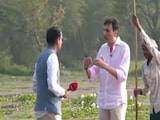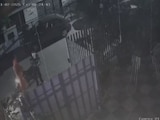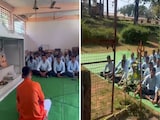Former United Press Cuba correspondent Henry Raymont with Fidel Castro.
In the early hours of April 17, 1961, United Press Cuba correspondent Henry Raymont heard a rap on his door in Havana.
Minutes before, the journalist had phoned to New York alerting the news desk that an invasion appeared imminent. The men armed with rifles who appeared at his apartment whisked him away to the Cuban military intelligence headquarters, on suspicion, he was told, that he was a spy.
So began Raymont's ordeal as an American journalist imprisoned by Fidel Castro's forces during the Bay of Pigs operation. After Castro's death on Friday, the District of Columbia resident had occasion to recall his unique experience more than a half-century ago as a witness to history.
Ultimately, Raymont was freed after six days in prison helped by fellow journalists who petitioned for his release through diplomatic back channels.
For Raymont, the stay in the Cuban prison was only a blip in his long professional relationship with the bearded revolutionary Communist. Shortly after he was freed, Raymont met Castro.
"He said, 'big mistake' and 'I'll make it up to you,' " Raymont, now 89, recounted Saturday in a telephone interview.
Raymont said others in his prison cell -- rounded up on trumped-up charges related to the botched, U.S.-backed coup attempt -- were summarily executed.
Nonetheless, Raymont said that he came to respect, if not admire, the Cuban leader. Raymont acknowledged that Castro was responsible for countless deaths and much suffering, but he said that he developed a rapport with Castro through hours of interviews.
"Nothing is black; nothing is white," Raymont said. "He considered me a friendly journalist."
In all, Raymont said he interviewed Castro on eight occassions and spent several days accompanying him on jaunts around the Carribbean nation in his Jeep and in visits to his secluded resort on a small isle off the coast. They drank rum. They smoked cigars.
Along with Associated Press reporter and Castro biographer Tad Szulc, Raymont roasted a goose and taught the Cuban leader to make chopped liver, a delicasy of Szulc's Polish youth. Raymont reminisced Saturday about his time with Castro.
"I was sadly suprised by the news today," said Raymont. "I found him to be an absolutely extraordinary personality. He had a wonderful sense of humor and yes he could also be a son of a [expletive]."
Raymont added: "Don't forget that I was also imprisoned."
In April 1961, Raymont was reporting in Havana when word came that an attack on Castro's government appeared to be underway at the Bay of Pigs. When he called the United Press in New York he spoke to a confused telephone operator who expected a sports section update.
"She thought I was reporting on a bicycle race," Raymont said. "Here I was with 'flash' five-bell news item. She didn't know anything about the invasion."
The United Press distributed a first-person account of his experience that Raymont wrote after returning to the United States.
He was held in a 14-by-16-foot cell along with 50 other men. He was interrogated, threatened with espionage charges and informed that he'd been sentenced to death.
"With me were Cubans of all walks of life - the dean of engineering at the University of Villanueva, a physician, a 72-year-old farmer, three university students, a retired boxer, five high school teachers, four bus drivers, six sugar workers, several peasants and a rural barber," Raymont wrote.
When he met his cellmates one remarked: "Welcome to the national tourist center. Here we are all millionaires and Martians."
"Why Martians?" Raymont asked.
"Because Fidel says there are no workers or peasants jailed, only landowners, so we must come from Mars."
He befriended his cellmates, who appeared at peace with their impending deaths.
"There were people in there that knew they would be shot the next morning and you know what? They sang," Raymont said.
Raymont said he now views Castro as a charismatic populist who paradoxically pushed for advancing medical treatment for the Cuban people while also ordering the deaths of his dissenters.
"I'm quite aware of the injustices and so forth but also aware that he made a revolution that changed Cuba," Raymont said.
Under Castro, Raymont said, "a nothing country became an epicenter of power politics."
As a token of their relationship, Castro gave Raymont a signed copy of the revolutionary's booklet, "History Will Absolve Me."
In his inscription, Castro wrote that together they shared "one of the most fabulous and passionate stories of our revolution."
© 2016 The Washington Post
(This story has not been edited by NDTV staff and is auto-generated from a syndicated feed.)
Minutes before, the journalist had phoned to New York alerting the news desk that an invasion appeared imminent. The men armed with rifles who appeared at his apartment whisked him away to the Cuban military intelligence headquarters, on suspicion, he was told, that he was a spy.
So began Raymont's ordeal as an American journalist imprisoned by Fidel Castro's forces during the Bay of Pigs operation. After Castro's death on Friday, the District of Columbia resident had occasion to recall his unique experience more than a half-century ago as a witness to history.
Ultimately, Raymont was freed after six days in prison helped by fellow journalists who petitioned for his release through diplomatic back channels.
For Raymont, the stay in the Cuban prison was only a blip in his long professional relationship with the bearded revolutionary Communist. Shortly after he was freed, Raymont met Castro.
"He said, 'big mistake' and 'I'll make it up to you,' " Raymont, now 89, recounted Saturday in a telephone interview.
Raymont said others in his prison cell -- rounded up on trumped-up charges related to the botched, U.S.-backed coup attempt -- were summarily executed.
Nonetheless, Raymont said that he came to respect, if not admire, the Cuban leader. Raymont acknowledged that Castro was responsible for countless deaths and much suffering, but he said that he developed a rapport with Castro through hours of interviews.
"Nothing is black; nothing is white," Raymont said. "He considered me a friendly journalist."
In all, Raymont said he interviewed Castro on eight occassions and spent several days accompanying him on jaunts around the Carribbean nation in his Jeep and in visits to his secluded resort on a small isle off the coast. They drank rum. They smoked cigars.
Along with Associated Press reporter and Castro biographer Tad Szulc, Raymont roasted a goose and taught the Cuban leader to make chopped liver, a delicasy of Szulc's Polish youth. Raymont reminisced Saturday about his time with Castro.
"I was sadly suprised by the news today," said Raymont. "I found him to be an absolutely extraordinary personality. He had a wonderful sense of humor and yes he could also be a son of a [expletive]."
Raymont added: "Don't forget that I was also imprisoned."
In April 1961, Raymont was reporting in Havana when word came that an attack on Castro's government appeared to be underway at the Bay of Pigs. When he called the United Press in New York he spoke to a confused telephone operator who expected a sports section update.
"She thought I was reporting on a bicycle race," Raymont said. "Here I was with 'flash' five-bell news item. She didn't know anything about the invasion."
The United Press distributed a first-person account of his experience that Raymont wrote after returning to the United States.
He was held in a 14-by-16-foot cell along with 50 other men. He was interrogated, threatened with espionage charges and informed that he'd been sentenced to death.
"With me were Cubans of all walks of life - the dean of engineering at the University of Villanueva, a physician, a 72-year-old farmer, three university students, a retired boxer, five high school teachers, four bus drivers, six sugar workers, several peasants and a rural barber," Raymont wrote.
When he met his cellmates one remarked: "Welcome to the national tourist center. Here we are all millionaires and Martians."
"Why Martians?" Raymont asked.
"Because Fidel says there are no workers or peasants jailed, only landowners, so we must come from Mars."
He befriended his cellmates, who appeared at peace with their impending deaths.
"There were people in there that knew they would be shot the next morning and you know what? They sang," Raymont said.
Raymont said he now views Castro as a charismatic populist who paradoxically pushed for advancing medical treatment for the Cuban people while also ordering the deaths of his dissenters.
"I'm quite aware of the injustices and so forth but also aware that he made a revolution that changed Cuba," Raymont said.
Under Castro, Raymont said, "a nothing country became an epicenter of power politics."
As a token of their relationship, Castro gave Raymont a signed copy of the revolutionary's booklet, "History Will Absolve Me."
In his inscription, Castro wrote that together they shared "one of the most fabulous and passionate stories of our revolution."
© 2016 The Washington Post
(This story has not been edited by NDTV staff and is auto-generated from a syndicated feed.)















